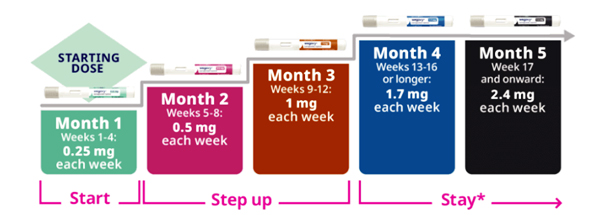Menopausal Weight Management

Proven Menopausal Weight Loss For Women Over 40
MenoClinic offers Specialist-led care for safe and effective weight loss with GLP-1 therapy. Tailored to your needs based on unique hormonal changes in perimenopause, menopause and beyond.
Are you:
- Aged 18 to 75 years
- Your BMI of 30 or more
- Your BMI of 27 or more, and at least one weight-related health condition (eg, prediabetes, high blood pressure)
How does it Work?
- Complete our questionnaire
To assess your eligibility, and book a 15-minute face-to-facevideo consultation on your first appointment to help select the most suitable medication for your needs and lifestyle. - We approve your order
Our team will review and safely approve your prescription - Your order is delivered
Discretely packaged.Next-day delivery UK-wide from a GPhC-registered pharmacy
Weight Management Pricing
 Up to 22.5% weight loss*
Up to 22.5% weight loss*
 Up to 17.4% weight loss*
Up to 17.4% weight loss*
Why Hormonal Weight is Different
Hormonal changes during perimenopause and menopause make it much easier to gain weight, especially in the midsection:
- Lower oestrogen: Reduces how efficiently your body stores fat, so instead of accumulating in the hips and thighs, it’s more likely to collect deep in the abdomen, known as visceral fat
- Progesterone changes: Declining progesterone leaves women more prone to bloating and water retention. This can give the appearance of fat gain but may settle with time.
- Androgen balance: Testosterone and other androgens become more dominant compared to dropping oestrogen. This “relative androgen excess” further drives central (belly) fat storage.
- Insulin sensitivity: Menopause can impair how efficiently the body processes carbohydrates, leading to higher blood sugar spikes and easier fat storage.
- Leptin & ghrelin signals: These appetite-regulating hormones may get disrupted, resulting in stronger hunger cues or weaker fullness signals.
- Lean muscle loss: Ageing naturally reduces muscle, which lowers resting metabolic rate. The fewer calories you burn at rest, the more likely you are to gain weight, unless diet and activity are adjusted.
Perimenopause Sudden Weight Gain Vs Gradual Gain
Not all women experience weight gain the same way:
- Gradual gain:Many experience a slow increase (1-2lbs/year) from their late 30s onwards due to a combination of lifestyle and hormonal changes.
- Sudden gain:Some see a more dramatic increase in perimenopause, particularly around the belly. Contributing factors include:
- Poor sleep due to hot flashes and night sweats
- Chronic stress and higher cortisol levels
- Medication side effects (e.g. antidepressants, steroids)
- Thyroid dysfunction, which must be ruled out if weight gain is rapid or unexpected
How Long Does Menopause Weight Gain Last?
Weight gain usually tracks with the stages of the hormonal transition, on average gaining 1-1.5kg per year for as many years as you are in this stage:
- Perimenopause: Can last 8-10 years,but weight gain is more pronounced, especially around the belly.
- Menopause (12 months after last period):Weight may continue to creep up but can stabilise as hormone levels settle to a “new normal”. Lifestyle interventions are critical at this stage.
- Post-menopause: With a consistent diet and activity plan, weight can stabilise or be reduced and fat loss is still possible.
Health Risks of Abdominal Fat Gain
Weight gain during menopause isn’t just a cosmetic concern, it has health consequences:
- Cardio-metabolic risk: Visceral fat (fat around the organs) increases the risk of high blood pressure, abnormal cholesterol, and insulin resistance, all of which raise cardiovascular disease risk.
- Glucose control: Belly fat is strongly linked with a higher risk of type 2 diabetes.
- BMI vs fat distribution: Even if your BMI falls within a “healthy” range, carrying visceral fat increases long-term health risks.
Benefits of taking Weight Management Medication:
GLP-1 medicationcombined with a lower-calorie diet and greater physical activity:
- To minimise the risk of serious cardiovascular events such as mortality, heart attack, or stroke in people with known heart disease who are obese or overweight.
- It may benefit adults and children aged 18 years and older with obesity, or certain adults who are overweight and have weight-related medical conditions
- Losing weight and maintaining it has numerous benefits. Maintaining a healthy weight can minimise the risk of developing serious conditions such as:
- Cardiovascular disease
- Diabetes
- Stroke
- Cancer
- Being a healthy weight can also improve many other aspects of your health:
- Reduced symptoms of existing conditions such as asthma
- Feeling like you have “more energy”
- Reduced strain on your joints
- Better sleep
- More self-confidence and a positive outlook.
- Improvement in conditions like erectile dysfunction
Treatment Approach at Menoclinic
Menoclinic’s weight loss programme is unique in that it fuses GLP-1 medication that is clinically proven to support weight loss, with a personalised lifestyle plan to help women in perimenopause, menopause or post-menopause.
It’s not about crash diets, it’s about developing healthy habits that support changing hormones and metabolism. The best approach has four key pillars:
- Nutrition: Eat plenty of protein, fibre and minimal processed foods. Avoid ‘low-calorie’ fad diets that will only slow your metabolism even further.
- Activity:Resistance training 2 to 3 times a week, with cardiovascular exercise. Strength training will preserve muscle mass (required for resting metabolism), and cardio can help with heart health and fat loss.
- Recovery: Sleep quality and stress are key. Hot flushes, night sweats and anxiety can all raise cortisol, a stress hormone that causes belly fat. Helpful strategies include sleep routines, a cooling sleep environment, relaxation techniques and reducing alcohol.
- Medical: Review medication with our pharmacist or your doctor to identify any medication that could be adding to weight gain. Ask our specialist about HRT for menopause symptom relief, and if lifestyle changes aren’t enough, ask about prescription weight-loss medication for which you may be eligible.
Weight Management with GLP-1 Therapy, Mounjaro & Wegovy
Weight loss during perimenopause and menopause can seem like an uphill battle. Your dropping oestrogen and progesterone hormones slow down your metabolism, increase abdominal fat storage, and decrease your body’s sensitivity to insulin. If you’re eating well and exercising regularly, the scale might not move. This can be frustrating, but it’s not your fault.
At Menoclinic, we offer weight loss programs tailored specifically for women who are going through perimenopause, menopause, and beyond. We believe in a medically supervised method that combines weight loss medications with a customised nutrition, exercise, and lifestyle plan. Our programs focus on GLP-1 medications and are designed to help you reach your weight loss goals in a safe and sustainable way.
What are GLP-1 Medications
Mounjaro (Tirzepatide) and Wegovy (Semaglutide) are GLP-1 prescription medications approved for weight management to help people who have difficulty achieving and maintaining results through diet and exercise alone. At MenoClinic, we offer evidence-based recommendations and personalised care to help you determine if Mounjaro or Wegovy is right for you.

Book a consultation with us today
Symptom
Checker
Our symptom checker makes it easier for you to identify your symptoms and pinpoint whether menopause is the root cause of your issues, or if we need to refer you for further investigations.





